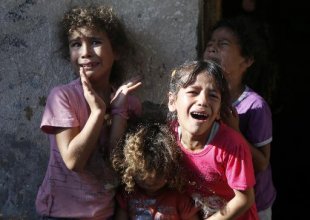Gaza: The Story of a Palestinian Father who Lost his Children in the Darkness

Around the flickering, dim light of a candle nearly gone, the family of Abu Mohammed Shabet gathered in their house in Hayy al-Touffah, north-east of Gaza City, to break their fast. In the background, they could hear explosions caused by bombs fired by Israeli tanks positioned on the eastern borders of the Strip, aimed at the houses of unarmed civilians.
Gaza – As soon as the family finished their meal, Abu Mohammed tried to calm his frightened children who were asking him to flee the house and take refuge with some relatives downtown in hopes that it would be a little safer there. But the father insisted on staying home.
“Nothing is going to happen to us. Do not worry, the bombs are far away from us,” Abu Mohammed reassured them.
As soon as he finished his sentence, a powerful explosion was heard and a large fire broke out in a hall at the house where they were gathered. Abu Mohammed was in deep shock. He did not grasp the fact that his house was targeted, especially since the power had been down for three days.
It all happened so fast, a few seconds that Abu Mohammed experienced as days, months, even years. He saw something he had “never seen before” in his 59 years.
He told Al-Akhbar, “my little children’s limbs scattered before me.” He did not really see them, it was too dark but he felt them. He did not pay much attention to the neighbors’ screams and cries of ‘God is great,’ as they tried to save them. His tongue was tied and his voice failed to cry out for help.
He went on feeling his way through [the debris], looking for his children, his hands immediately sensing heat as soon as they laid on the body of one of his sons whom he could not identify. “What is this? Who are you? What’s happening to you?” He asked many questions in a few of seconds, but all remained unanswered. He was talking to a lifeless body…
He lifted [his son’s hand] and felt warm drops coming down from his body.
“That’s when I started yelling as loud as I could. I did not know where I was or where my children were, their warm bodies terrified me, and I felt that I had lost them all,” Abu Mohammed told Al-Akhbar from his hospital bed in al-Shifa’a Medical Center.
He then asked, “What is happening? What is all this? Is this a nightmare?”
Al-Akhbar asked him what exactly happened to him, but he insisted that he had no memory of his endurance in the darkness; he only remembers the blood of his children and that he could not tell them apart. Then, he was blinded by a flashing light coming from rescue workers. He lost consciousness and woke up later at the hospital.
During the interview, Abu Mohammed learned that his three children were martyred. He cried out “Impossible, oh God no, do not deprive me of them. I have not seen them oh God, I still want them. Oh God, I promised to buy them new clothes for Eid and I have not kept my promise.”
We approached him, trying to comfort him, but he cried out, “is the shelling and destruction not enough? There was also no electricity to help me save at least one of them.”
“Maybe some of them were martyred as they were trying to extricate them, maybe they were alive but the lack of electricity killed them,” he sighed.
Electricity has been cut off in large parts of Gaza, and most areas have been plunged into complete darkness, only receiving electricity for about four hours a day.
Here, the night has become a fearful ghost, haunting Gaza’s residents. Families who have evaded the shelling so far are also facing long dreadful nights, overwhelmed by the sounds of explosions caused by missiles fired from military aircrafts or arterially shelling targeting civilians’ houses, amid power cuts that shut Gazans from the outside world.
This article is an edited translation from the Arabic Edition.

